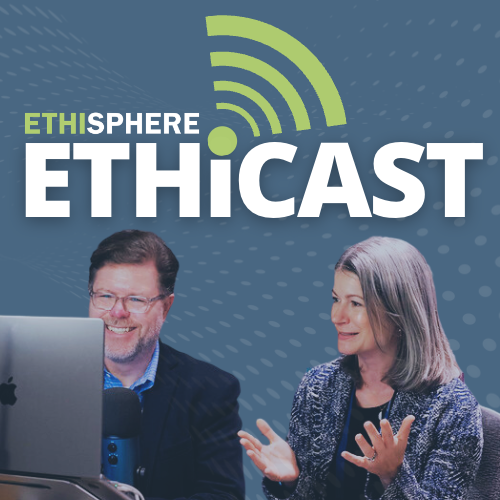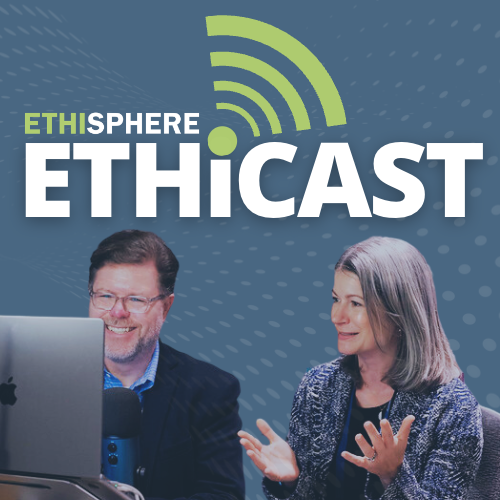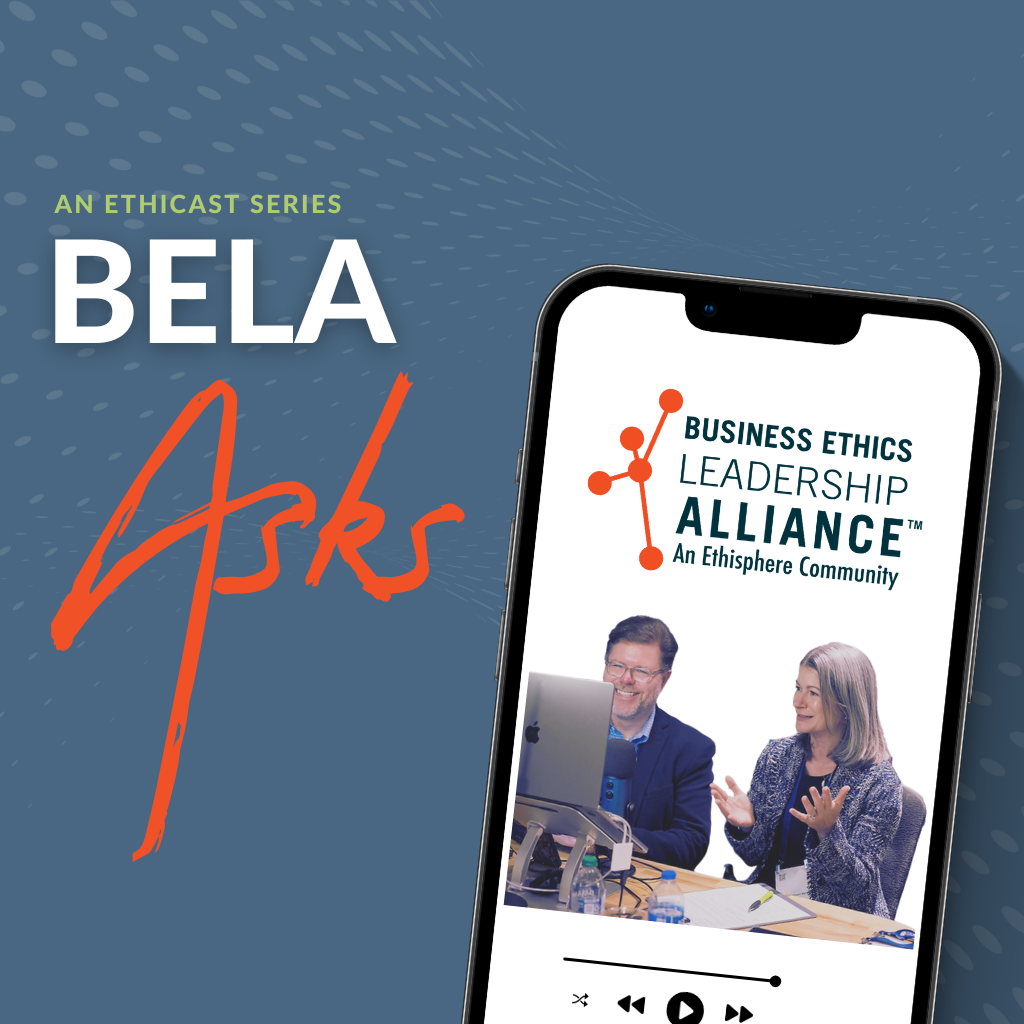Episode Transcript
Hi, everyone! And welcome to another episode of the Ethicast. I’m your host, Bill Coffin. And in this episode, we’re going to change things up a little and talk about video games, grief, and the power of second chances. I promise it will all make sense, but before we begin, a trigger warning. This editorial covers the topic of self-harm. If that topic is especially difficult for you, please proceed with caution. Or, feel free to skip this episode and check us out in a few days when our next one drops.
I’m going to share with you now an editorial entitled Press X to Continue, which for video games, is shorthand for the prompt often given to players after the game ends, which allows the player to keep on playing anyway. This editorial is from the recently published Fall issue of Ethisphere Magazine. At the end of this episode, I’ll share how you can get a free copy of the Fall issue, which contains a special section on careers in ethics and compliance as well as other features that showcase contributions from Second City Works, Indiana University’s Kelley School of Business, Husch Blackwell, and more.
But there is one story in particular that I’d like to call out, entitled Serious Fun, which is an in-depth interview with Jen Brewer, Chief Ethics and Compliance Officer at video game giant Activision Blizzard King, or ABK. It’s a story I’m proud of. I very much enjoyed speaking with Jen, who has a lot of brilliant things to say about what she and her team are achieving at ABK, which recently concluded its historic $69 billion merger with Microsoft. As a company under intense scrutiny not just from regulators but from its various stakeholders and even its own fans, ABK has a particularly high set of expectations to live up to. It has not always lived up to them, as a Google search about the company will reveal. I was aware of that when I interviewed Jen, and I was not particularly interested in addressing those things because that wasn’t the point of the interview. And it still isn’t. But it’s also worthy of an explanation. Which brings us to my editorial.
And now, Press X to Continue.
In 2009, I lost my brother Tom to suicide. At the time, he was living in Atlanta, GA, and I was living in New Jersey. We primarily stayed in touch through the chat function of World of Warcraft, a massively multiplayer online role-playing game published by Blizzard. We played together almost every night for three years before he died. I played the game without him for another two after he was gone.
The tragic circumstances of my brother’s death made 2009 a missing year for me as I processed my grief. It was not easy. And as time went on, I became more and more fixated on the fact that the character my brother played in World of Warcraft—the avatar by which I visually identified him so many times, and in fact, was the form in which I saw him last before he died—was in a kind of digital limbo now that nobody would ever log into his account ever again. I knew my grief journey would not progress until I transferred his character to my account. As I would tell my friends and family, I felt the need to bring him home.
To transfer the World of Warcraft account of a deceased family member requires both paperwork and knowledge of the account. I had the first, but not the second. Suddenly, Blizzard’s excellent track record of protecting customer data put a roadblock before me. As I spoke with Blizzard customer service reps to explain my problem, I was struck by their enormous empathy and professionalism as they tried to help me get access to my brother’s account without violating their own data privacy standards. Eventually, we found a compliant way to transfer my brother’s character to my account. The day I logged on and found Meester the Troll waiting for me, it was like walking into a room and finding my brother there, alive and well again. I burst into tears. My healing had finally begun.
I share that story with people whenever Activision Blizzard King comes up in conversation. When I got my opportunity to do a story on ABK, some of my gamer friends who had pointed opinions about the company challenged me. Why should I give Activision Blizzard King a platform, given its history of toxic workplace allegations? Fair question.
The answer is easy. No company is perfect. ABK isn’t. Many companies have dark moments they must work through. ABK does. But when organizations are genuine and passionate about using the painful lessons they have learned to build a better culture for everyone—as I believe Activision Blizzard King is—then that story deserves to be told.
Activision Blizzard King is in the business of making games. And games are a funny thing. They provide entertainment, but they can also make the world a better place. World of Warcraft wasn’t designed to help people grieve any more than Tony Hawk’s was designed to save lives—which it has—by making helmet use during skateboarding look cool. Call of Duty and Overwatch weren’t designed to help people stay close to each other and provide mutual support during the COVID-19 lockdown. But they did. Some game ABK publishes in 2024 or 2025 or 2026 won’t necessarily be designed to help some player deal with a major life struggle. But it will.
It's easy for us to judge an organization that has fallen short of our ethical expectations. It is more important, however, to judge them on how they use their opportunity to do better. Everything we do matters, however small or unintentional it may be. Whatever business we are in, somehow, it is the business of changing lives. And if somebody is trying to do better at being better, the helpful thing isn’t to sneer at them. It is to ask them how it’s going, and what we can do to help.
This editorial is taken from the Fall 2023 issue of Ethisphere Magazine, which is available now for free download. To get your copy of this issue, please visit magazine.ethisphere.com and hit that magazine cover graphic you’ll find waiting for you.
I’m Bill Coffin, and this has been the Ethicast. For more episodes, please visit the Ethisphere YouTube channel at youtube.com/ethisphere. If this is your first time enjoying the show, please make sure to like and subscribe either on YouTube or on our podcasting platforms at Apple, Spotify, Google, and Amazon Music.
And to learn more about values-based leadership, ethical business culture, and the social license to operate, please visit the Ethisphere Resource Center at Ethisphere.com. Once you’re there, hit the Resources tab for a wealth of helpful videos, reports, presentations, and more.
Thanks for joining us! Until next time, remember: Strong ethics is good business.


